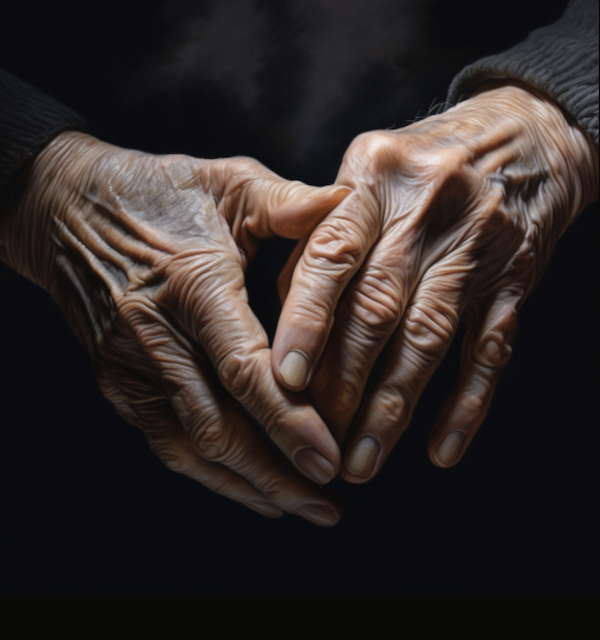Confessions of an Imperfect Caregiver
by Rick Bowers

Being a caregiver for my aging and disabled parents was perhaps the most challenging and enlightening experiences of my life. And, as I’ve discovered from other caregivers’ stories, my journey was not uncommon.
The physical demands, time commitment, financial burdens, and emotional complexities involved in caregiving make it crucial for all parties to remember that love is the foundation of your relationship and the reason you stand together in this situation.
Before I became a caregiver myself, I had learned a lot about caregiving from working in a hospital, from working in various group homes for people with disabilities, and from my stints as an editor of disability-related publications. However, even all of that knowledge did not prepare me for what it was really like. I learned a lot more firsthand when I became the sole in-person caregiver for my mother and then my father for several years.
I’d always thought that when my parents got older and started having health problems, I would move them in with my family and take care of them in any way they needed.
The hope and intentions were good. Unfortunately, it didn’t work out that way.
Still, when they started having health problems, I didn’t want them to go to a nursing home, and they didn’t want to go to one. Therefore, I tried my best to do everything I could to help them in their own home.
Fortunately, I had already started working from home as a writer and editor, which gave me the freedom and flexibility to help my father care for my mother when she started having major health problems, including diabetes and its complications, high blood pressure, chronic obstructive pulmonary disease (COPD), Parkinson’s disease, and back and hip problems. Yes, she had almost everything.
At the time, my father was also having health problems but was still able to help with my mother for a while.
Initially, I drove to their house every day, sometimes twice, despite the over-30-minute trip each way. I’d take them food, help around the house, and help move my mother as needed after she became bedridden 24/7, 365 days a year.
I wanted to help more, but it was difficult since I was quite busy and also had back problems and other health issues myself, including diabetes and obsessive-compulsive disorder (OCD).
From time to time, my mother and I would lose patience with each other and end up in heated arguments. I’m talking about the woman who had always been there for me and my wife and children and had a great relationship with us. Still, the stress and strain of caregiving led us to sometimes lash out at each other, which I, of course, deeply regret to this day.
I still took care of her, and there were many happy times as well.
Eventually, her health deteriorated to the point where I had to move into their spare bedroom and live with them. It was tough because I still had to work, plus I had to be available to help her with her increased care requirements. Her situation required me to give her medication around the clock; adjust her position in the bed from time to time; take care of household chores; pick up or make breakfast, lunch and dinner for her and my father; and take care of all of her bathroom needs since she couldn’t get up.
In addition, for a while, she required a breathing machine that had an alarm that would constantly go off throughout the night and require me to get up and try to fix the problem that was causing the alarm. The machine was very sensitive, and the slightest problem would set off the alarm. Moreover, I also needed to take care of all of their paperwork and bills and sign up for their insurance, etc.

Taking her to the doctor was extremely difficult, and we had to pay a transport service to help us. On one occasion, while we were preparing for an appointment, she fell while we were trying to get her out of bed. After we struggled a long time to try to get her back in bed ourselves, we had to call the rescue squad to come and lift her back into the bed.
My father also started having more health problems and would have to go to the hospital and a rehab facility from time to time. As a result, he became less able to help with my mother. At that point, I was juggling work, responsibilities at my own house in a nearby city, and caring for them all alone in their house.
Ultimately, my mother’s condition worsened, and we organized hospice care for her at home. It was horrible as she screamed night and day in agony. I was having to give her morphine and many other medications around the clock, every hour or two hours or so, and was often too exhausted to move but had to anyway. At that point, my daughter started coming over to help me out.
Now that I reflect on it, I know that my nerves were shot, and I hope that I can blame them for some of our blowups. Even though I realize that, I still have feelings of guilt.
My mother’s pain became so unbearable that her medicine was not enough to relieve it to a sufficient degree. Her condition worsened so much that we finally had to arrange for her insurance to pay for her to go to a healthcare facility for a few days to provide her better care and to give me a physical and emotional break. Insurance would cover this respite care for a few days, and then she was to be returned home.
Transporting her to the facility required an ambulance, and we and the ambulance team struggled to move her from her bed into a wheelchair and then onto a stretcher and into the ambulance. She stayed at the facility for a few days until her insurance wouldn’t pay anymore, and they were getting ready to bring her home even though she was in no condition to return. They finally allowed us to pay for extra days so that she could stay.
She passed away at the facility a few days later.
And I was sad but also relieved. Her quality of life had vanished, leaving her with only extreme pain and suffering. It was time.
My purpose for sharing my experience is so that anyone who needs caregiving can understand the caregiver’s dilemma and know that even when caregivers have the best intentions, they can fall short. It doesn’t mean they don’t want to help or that they don’t want to do better. Sometimes, it’s just more than they can handle.
Just remember, if they’re there, even when they fall short at times, get frustrated, or complain about something, they still love you and they will regret those things and feel guilty about them. I also want caregivers to understand that their loved one’s anger with them might be related to the medications they’re taking, the pain they are suffering, their embarrassment at needing assistance, their guilt about causing you difficulties, their fear of the future, and a host of other reasons. The psychological factors involved in such a relationship are complex.
When I sometimes think about the problems my mother and I had, I also realize that she and I both had diabetes, which is known to heighten feelings of anger.
What I know now is that my mother didn’t truly want to be angry with me, and I didn’t truly want to be angry with her.
The situation was more difficult than both of us expected, and we both failed at times to overcome it.
If you are a caregiver or the one who is being taken care of, I hope you will see that this situation is common and will forgive yourself and your loved one for any moments that seem like “failure.”
Always hold on to the happy times and the cherished moments you once shared. And remember to smile.
No one should misunderstand this article and think that my purpose is to complain about the difficulties of caregiving. In fact, I consider my caregiving experience with my parents as one of the highlights of my life. I am so thankful that I had the opportunity to be able to assist them during this difficult period. I simply want caregivers and those they care for to know that it’s common for each of them to fall short of perfection during such a stressful time and to forgive each other and themselves.
*** Special thanks to my wife, children and sister, who were all part of the care team that made it possible for me to stay with my parents full time. I don’t know how we could have done it without everyone playing their part.
This article was originally published in RESILIENCE magazine (https://resiliencemag.com): https://resiliencemag.com/resilience-issue-1/

